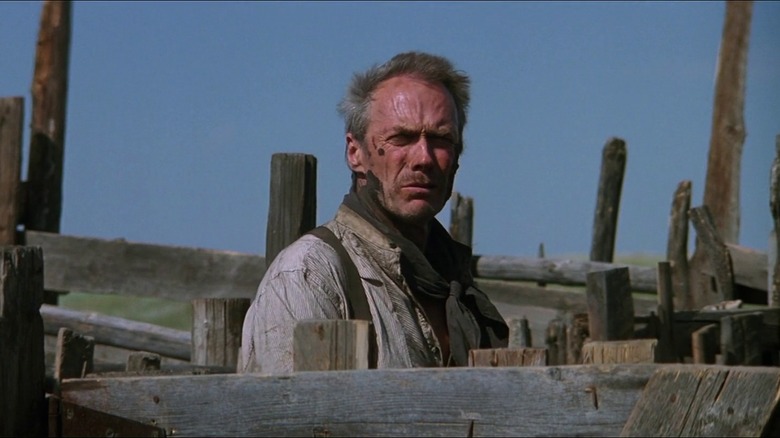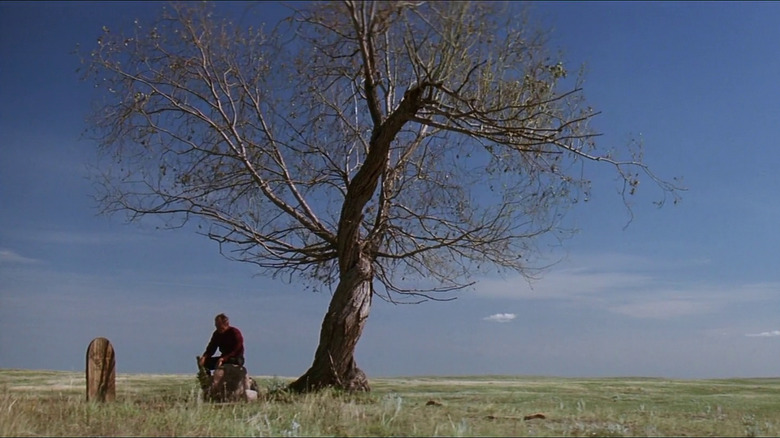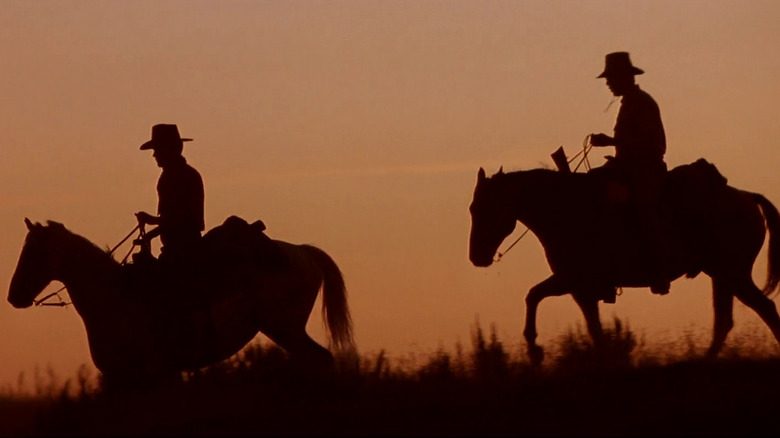Yellowstone Fans Should Watch Taylor Sheridan's Favorite Clint Eastwood Western
While your mileage may vary when it comes to Taylor Sheridan's numerous movies and TV shows, you can't deny that the man has taste. He knows the good stuff and often draws inspiration from the best when it comes to his own screenplays and directorial efforts. In 2017, right before his self-proclaimed directorial debut "Wind River" came out, Sheridan spoke with Rotten Tomatoes about his favorite movies or, more specifically, the ones that meant the most to him as a filmmaker. I don't think it'll come as a big surprise to any Western lover that Clint Eastwood's iconic 1992 farewell to the genre, "Unforgiven," was sitting at the top of his list as one of his all-time best-loved features.
Sheridan praised Eastwood's masterpiece, saying, "Clint Eastwood demystified and destroyed our notion of a Western. He turned it upside down. It was marvelous acting, and at times, his use of monologue and dialogue — that doesn't ever take place in Westerns." He continued, "He did things in the storytelling that hadn't been done in the way that they were done."
If you've seen the movie and are familiar with Eastwood's work, you'll know exactly what Sheridan was talking about. "Unforgiven" was a deconstructionist Western that not only brought closure to Eastwood's gunslinger days as an actor, but also brazenly defied the essential and traditional tropes that used to define the genre for decades.
Unforgiven's William Munny was unlike any cowboy Eastwood had played before
In "Unforgiven," Eastwood's protagonist, William Munny, is a shell of a man. He's no unnamed hero — or a hero at all. He's a bitter widower living at a desolate farm, keeping hogs to support his two children (who don't think much of him). They don't know, but legend says their father used to be a fearless thief and a cold-blooded murderer. At least that's what the Schofield Kid (Jaimz Woolvett), who rides to the old man's house to ask for his help in a bounty hunting job, tells us early on. But Munny utters to him, "I ain't like that anymore." He initially turns the Kid down, but later reconsiders since he could really use the money.
But when he attempts to revive the old muscles from his golden days, they fail to remember the time when Munny could shoot several men dead in the blink of an eye. Now, he can't aim to save his life or even mount a horse without falling off first. He's a pathetic joke and knows it, too. His days as a skilled and merciless gunslinger are long gone. He's done with the whiskey and the killing — reformed by his late wife, who cured him of his wrongdoings — but the guilt in his heart for all the atrocities he committed still lingers like a dark cloud. The lack of true repentance burns his soul, so maybe this chance at delivering justice for an innocent woman is the penitence he needs for finally clearing his conscience.
Why Unforgiven was such a big deal in 1992
Before "Unforgiven," Eastwood had never played such an incompetent loser as Munny. Whenever the script (written by David Webb Peoples) attempts to glorify Munny (or depict him as a badass), Eastwood draws his portrayal back — both as an actor and director — to show him in the least favorable light possible. He underlines, over and over again, that Munny is not someone to emulate. He's not admirable, aspiring, or valiant — he's just an ex-outlaw. The only way Eastwood allows us to connect with the character is through his vulnerability and desire to become a better man. Munny wants salvation for his evil deeds, and Eastwood subtly lets us understand and feel his willingness for change, even if it seems unlikely.
Beyond the screenplay, Eastwood frames the entire film as an elegiac swan song to the genre that made him famous (and in which he no longer has a place). Times have changed, genres have ascended and descended, and the Old West, as we used to know it on the silver screen, had virtually ceased to exist. Through his melancholy use of light and compositions, Eastwood evokes an inherent finality that wafts through the picture from its first scene to its last. Instead of trying to imitate or pay homage to such classics as Sergio Leone's Dollars Trilogy or Don Siegel's "Coogan's Bluff," Eastwood wants to go out under his own terms, confidently demonstrating that he's become the kind of filmmaker that sets a trend (and style) rather than following one. Evidently, his subsequent movies, such as "A Perfect World" and "The Bridges of Madison County," unequivocally solidified him as a dominant and influential director for many decades.
If anything proves that to be true, it's how Taylor Sheridan revived the Western genre almost three decades after "Unforgiven," citing it both as an inspiration and a wildly entertaining movie that had a pivotal impact on his own storytelling approach.


